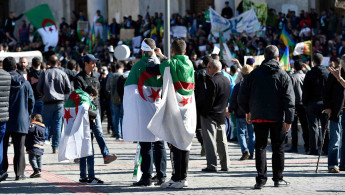Hundreds of thousands of Algerians take to the streets to demand president's ouster
Reuters journalists estimated the crowd at hundreds of thousands but no police estimate has been given.
Crowds congregated in Algier's landmark Grand Poste square, many draped in Algeria's red, green and white flag, calling on the 82-year-old to step down after two decades in power.
Riot police vans lined the street and helicopters circled above the protests, which some consider decisive against the ailing president.
Students, teachers, judges, and unions are among those protesting in the capital and other Algerian cities like Bejaia, Oran, Batna, Tizi Ouzou and others.
"Those who think we are tired are wrong. Our protests will not stop," doctor Madjid Benzida told Reuters, as police blocked the streets leading to parliament.
Hocine Kheldoun, a senior figure from Algeria's ruling party, said the night before that President Bouteflika was "history now". The senior spokesmans public break from Bouteflika marks a major setback for the president.
Algeria's new Prime Minister, Noureddine Bedoui, sought to calm tensions on Thursday ahead of the planned demonstrations. People "must show calm and act peacefully", Bedoui said, calling for "dialogue" to resolve the situation.
Bouteflika ceded to protesters' demands that he abandon plans for a fifth term, and promised reforms addressing concerns of Algeria's frustrated youth. But he also cancelled the 18 April presidential election without setting a new date, allowing him to cling to power indefinitely.
|
Protestors initially celebrated when they heard the news he would not stand for a fifth term, but his move to cancel the vote prompted accusations of "tricks" and triggered fresh protests.
Friday's protests will be a key test of whether the ailing president's manoeuvre has dampened anger on the streets.
The protests started after Friday prayers, as Mohammed Abdelkader Haider, a cleric from an Algiers mosque, appealed for patience.
The protest movement has been led by students, in a country where half the population is under the age of 30 and youth unemployment has spurred anger against a government seen as out of touch.
"It marks the awakening of a considerable section of Algerian society who have grown up surrounded by state corruption, the targeting of political opposition, the continued lack of investment or progress across education and welfare services," writes Malia Bouattia in her piece for The New Arab.
Bedoui, who replaced unpopular premier Ahmed Ouyahia, defended the postponement of the poll which many see as unconstitutional.
"We have heard the message of the Algerian youth," he said on Thursday, adding that the new government would be revealed by next week at the latest.
Bouteflika has promised a "national conference" to carry out reforms and set a date for new elections "before the end of 2019", suggesting he may stay in office for another year.
Incoming deputy Prime Minister Ramtane Lamamra, who appeared alongside Bedoui at a news conference in Algiers, said the previous evening that the conference should happen "as soon as possible".
"The absolute priority is to reunite the Algerians and allow them to go together towards a better future," he said. "It's not about staying in power for a few weeks or a few months more."
Bouteflika returned from Switzerland, where he was undergoing "routine medical checks", on Sunday. Algerians have barely seen their president since he suffered a stroke in 2013.




 Follow the Middle East's top stories in English at The New Arab on Google News
Follow the Middle East's top stories in English at The New Arab on Google News
![The UAE is widely suspected of arming the RSF militia [Getty]](/sites/default/files/styles/image_330x185/public/2024-11/GettyImages-472529908.jpg?h=69f2b9d0&itok=Yauw3YTG)
![Netanyahu furiously denounced the ICC [Getty]](/sites/default/files/styles/image_330x185/public/2024-11/GettyImages-2169352575.jpg?h=199d8c1f&itok=-vRiruf5)
![Both Hamas and the Palestinian Authority welcomed the ICC arrest warrants [Getty]](/sites/default/files/styles/image_330x185/public/2024-11/GettyImages-2178351173.jpg?h=199d8c1f&itok=TV858iVg)